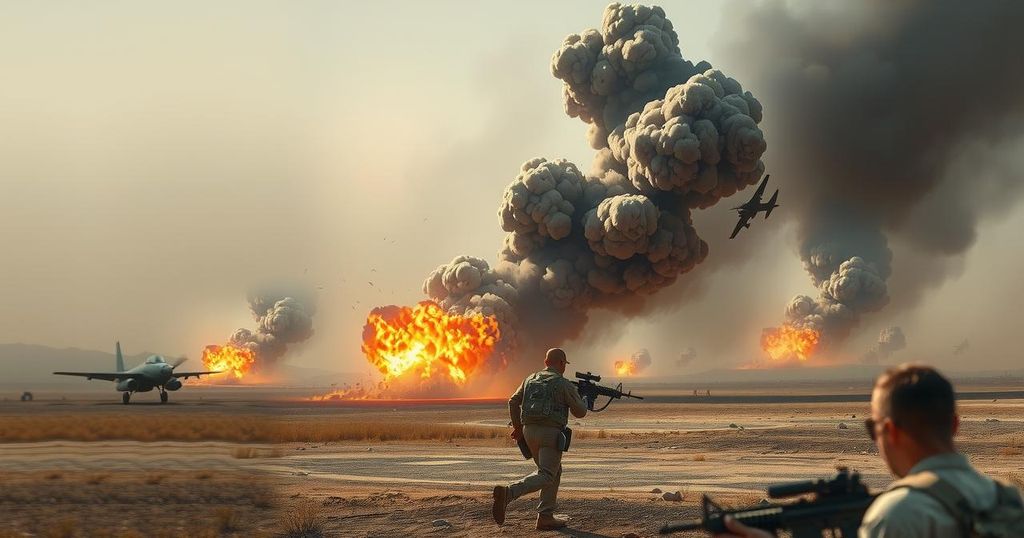U.S. Airstrikes Target Houthi Forces Amid Rising Tensions with Iran
U.S. airstrikes have targeted Houthi military installations in Yemen, resulting in significant destruction. While the Pentagon assures no civilian casualties, the Houthis report numerous deaths. President Trump warns Iran will be held accountable for any retaliatory actions. The ongoing military campaign aims to neutralize the Houthi threat while concerns about escalating tensions persist, particularly regarding Iran’s nuclear ambitions.
U.S. airstrikes over the weekend targeted Houthi military infrastructure in Yemen, destroying more than 30 installations, including drone and missile systems. Joint Staff Director for Operations Lt. Gen. Alexus Grynkewich reported numerous military casualties, asserting that there are no credible claims of civilian harm. The strikes aimed to impair the Houthis’ capabilities by dismantling training sites and weapon manufacturing facilities.
The Houthi rebels, however, claimed that the strikes resulted in 53 fatalities, including five children. Pentagon spokesperson Sean Parnell emphasized that the strikes were a clear warning: attacking American forces would have consequences but refrained from indicating an ongoing offensive. The focus remains on U.S. interests rather than regime change in the region.
President Donald Trump made it explicit that the Houthis are to be held accountable for retaliatory actions, signaling Iran’s responsibility for any aggression stemming from their proxy forces. Trump warned that future attacks would be met with significant retaliatory force directed at Iran itself. His remarks highlighted Iran’s role in supplying weapons and funding to the Houthis, characterizing them as the primary orchestrators of aggression in the region.
In a shift of tactics, the Houthis announced their intention to renew attacks in the Red Sea, purportedly to pressure Israel regarding humanitarian aid to Gaza. Meanwhile, Trump sought diplomatic engagement with Iran through a letter to its supreme leader but faced rejection due to his harsh stance on sanctions.
Trump asserted that military strikes would persist with overwhelming force until the Houthi threat is neutralized. However, the specifics of achieving this objective remain unclear, especially if their attacks continue. Concerns have arisen regarding potential U.S. troop deployment in Yemen, though officials maintain that such decisions remain uncertain.
Zineb Riboua from the Center for Peace and Security in the Middle East noted that the strikes aimed to disrupt Iranian supply chains crucial to Houthi operations, although the efficacy of such actions is contingent on the Houthis’ resilience and Iran’s continued assistance. The Houthis attempted to retaliate with strikes on the USS Harry S Truman, a carrier deployed in the region.
Secretary of State Marco Rubio pointed out that Houthi forces have directly attacked the U.S. Navy numerous times, exacerbating tensions on critical maritime routes where significant trade and humanitarian shipments occur. The military campaign against the Houthis marks a definitive escalation compared to previous administrations, signaling a departure from limited responses to more assertive military actions.
Iran distanced itself from the Houthis, with a senior military official claiming no direct involvement in the group’s operations. Yet voices advocating restraint argue that the U.S. should not expend resources addressing threats primarily affecting European and Chinese interests rather than American ones. There is a growing discourse on the necessity of addressing broader ideological conflicts with Iran rather than relying solely on military means.
Amid these geopolitical tensions, Iran’s uranium enrichment exceeds 60%, edging closer to weapon-grade levels. While Tehran maintains that it is not pursuing nuclear weapons, experts contend there is no civilian justification for such high levels of enrichment, escalating concerns over its nuclear ambitions.
In summary, the recent U.S. airstrikes against Houthi targets in Yemen have raised significant questions about the effectiveness of military intervention in the region. President Trump’s clear delineation of accountability between the Houthis and Iran reflects the complexity of Middle Eastern geopolitics. As the U.S. continues its military operations, the broader implications of its actions—both in terms of regional stability and the potential for escalation—remain of vital importance. The ongoing conflict highlights the urgent need for a coherent strategy that considers diplomatic avenues alongside military responses.
Original Source: www.foxnews.com




Post Comment